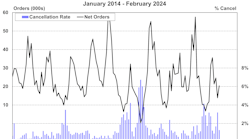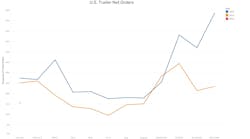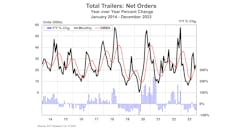Congressman Duncan Hunter, who represents California's 52nd Congressional District east of San Diego, said Congress needs to fix the trade rules that give other countries preference over the United States.
“It's manufacturing jobs that create wealth everywhere,” he said. “It's manufacturing jobs and manufacturing wealth that actually gives you goods, that produces a need for your trailers. You don't haul services, do you? Do you haul serving coffee? No, you haul goods. That's what we're lacking in this country — that manufacturing base has been bled away. And without the manufacturing base, there is no comeback for America. There were more employees that worked for GM in the '80s than at the top-10 high-tech companies combined now.
“Franklin Roosevelt said we have the ‘arsenal of democracy.’ That means that America makes so much stuff that if anybody else tries to mess with us or if our economy is going south, we can make stuff and buy stuff ourselves. We are our biggest consumer. But that's gone now. There are some high-tech companies a
nd some companies moving back from China and India, but we still make it too hard on people to make stuff. That's something Congress needs to look at.”
He also said Congress has “given up its power” through “bad earmarks.”
“What Congress is going to say is, ‘We're not going to appropriate any money for anything,’” he said. “So if I have a bridge or a road needs to be repaired, there's nothing I can do about it. That's what Congress has done do itself. Congress has neutered itself and taken away its ability to effect change in any administration. You think the Democrat Secretary of Transportation is going to give the Republican conservative Congressman in East County San Diego a second look? It's supposed to, but we know how real life works.
“So we've taken out our ability to influence things. Guess who ends up with that power? The bureaucracy does. Because the bureaucracy and Department of Transportation get to figure out where tax money is spent. That's one way that Congress had neutered itself. We've made ourselves ineffective by taking away the ability to control purse strings because you have bad players dropping earmarks in the dead of the night. Individual Congress people can still get in the weeds and change things. But Congress is like a cat chasing shiny objects. I have to study Medicare, regular health care, tax reform, transportation, education, national security, intelligence. And at least be somewhat knowledgeable. That makes us infective. If you're focusing on everything, you're focused on nothing. We can get stuff done in Congress. But the problem is, it's not a systemic reform. It's not tax reform. It doesn't fix the broken foundation on what we're living on.”
Hunter, according to his website, is a strong conservative who is “committed to strengthening national security, enforcing our borders, creating opportunities for American workers. and protecting the interests of taxpayers. He is also a strong proponent of the Second Amendment, protecting traditional marriage, and the rights of the unborn.”
Earlier this year, in a letter to the Federal Motor Carrier Safety Administration (FMCSA), Hunter — a member of the House Committee on Transportation and Infrastructure — expressed strong concerns regarding the accuracy of motor carrier safety records.
Specifically, under the current system, driver safety records administered by the FMCSA account for citations dismissed in court, therefore adversely affecting a driver's ability to operate. The issue remains a topic of scrutiny among congressional panels and industry groups.
“Safety is always a foremost priority,” said Hunter. “Driving records reveal important information that is useful in making judgments that are conducive to the safety of American highways. Driver infractions need to be noted and with the amount of time motor carrier operators spend on the road, a comprehensive but accurate account for every driver is necessary. But in cases where infractions are dismissed in court, operators are put at a disadvantage because the infraction is not automatically removed from their safety records.
“This system is unfair and harmful to operators, and it hurts their marketability. And, overall, what's needed is a system that is accurate and reliable, not one that continues to misrepresent operator safety records.”








